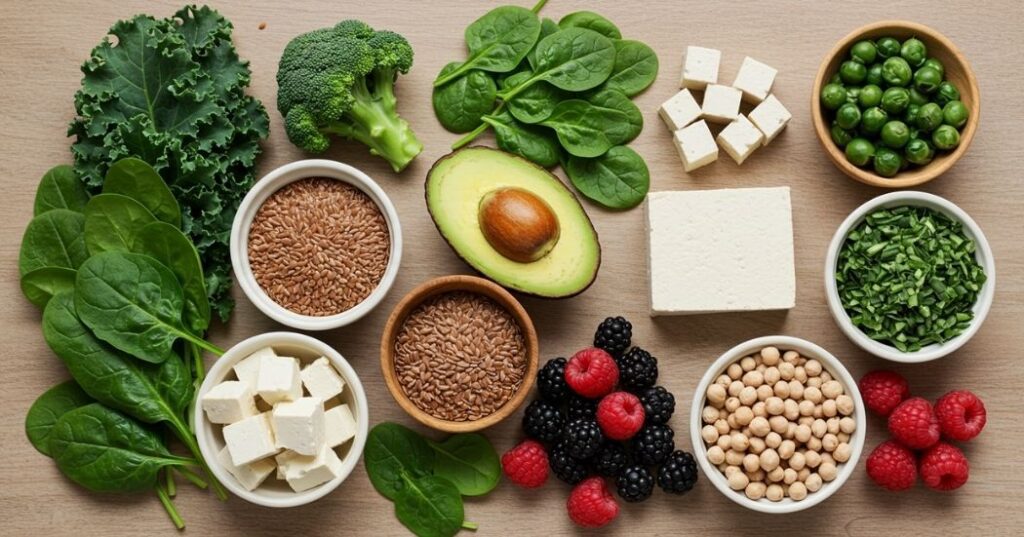More women are thoughtfully turning to plant-based eating—and for genuinely compelling reasons rooted in science. From achieving smoother hormonal balance and experiencing clearer, more radiant skin to enjoying sustained energy levels and bolstering long-term health, a plant-forward diet offers a wealth of science-backed benefits uniquely tailored to women’s bodies and their distinct physiological needs across different life stages.
Let’s delve deeper into how a diet truly rooted in nature can empower you to not just live, but truly thrive, feeling vibrant and balanced from within.

🌿 Hormonal Harmony: Cultivating Balance from Within
Hormonal fluctuations are a central aspect of a woman’s life, influencing everything from the regularity and comfort of menstrual cycles to fertility, mood, and the transition through perimenopause and menopause. A plant-based diet for women’s health offers gentle yet powerful support for achieving and maintaining this delicate hormonal balance through several key mechanisms:
- Phytoestrogens as Adaptogens: Plant-based foods are natural sources of phytoestrogens, plant compounds that structurally resemble human estrogen. Found abundantly in foods like soy (fermented forms like tempeh, miso, natto are often preferred), flaxseed, sesame seeds, and lentils, these compounds can act as mild estrogens when levels are low, or as anti-estrogens when levels are high, effectively helping to stabilize estrogen levels. This “modulating” effect can alleviate symptoms of both estrogen dominance (like heavy periods, PMS, breast tenderness) and estrogen deficiency (like hot flashes, mood swings).
- Fiber for Hormone Clearance: Dietary fiber, a cornerstone of a plant-based diet, plays a critical role in the natural detoxification and elimination of excess hormones, particularly estrogen. Fiber binds to estrogen in the digestive tract, facilitating its excretion from the body. This process is vital for reducing the risk of conditions linked to estrogen dominance and for supporting overall hormonal equilibrium.
- Healthy Fats for Hormone Production: Essential healthy fats, abundant in plant sources like avocados, nuts (especially walnuts, almonds), seeds (chia, flax, hemp), and olive oil, are fundamental building blocks for hormone production. Hormones, including sex hormones, are synthesized from cholesterol, and the body needs healthy fats to facilitate these processes efficiently and correctly. These fats also support the health of cell membranes, which are crucial for hormone reception.
A significant 2017 study published in Obstetrics & Gynecology provided compelling evidence, linking high-fiber, plant-rich dietary patterns with demonstrable improvements in menstrual regularity and a notable reduction in common PMS symptoms. This research underscores the direct, beneficial impact of a plant-based approach on female reproductive health.
✨ Skin Glow from the Inside Out: Radiance Rooted in Nutrition
Beyond external creams and treatments, the health and vibrancy of your skin are deeply reflective of your internal well-being and, crucially, your diet. A plant-based diet for women’s health supports natural detoxification and robust cell regeneration, leading to a truly radiant complexion:
- Vitamin C for Collagen Synthesis: Abundant in berries, bell peppers, citrus fruits, and leafy greens, Vitamin C is a vital co-factor in the production of collagen, the primary structural protein that gives skin its elasticity, firmness, and youthful appearance. Adequate Vitamin C intake helps maintain skin integrity and accelerate wound healing.
- Vitamin A (Beta-Carotene) for Cell Turnover: Found in vibrant orange and dark green vegetables like sweet potatoes, carrots, kale, and spinach, Vitamin A (in the form of beta-carotene) is crucial for healthy skin cell turnover. It helps to regulate oil production, reduce inflammation, and can significantly mitigate issues like acne, rosacea, and dullness, promoting a clearer, smoother complexion.
- Zinc & Selenium for Antioxidant Defense: Seeds (pumpkin, sunflower), legumes, and whole grains are excellent plant-based sources of zinc and selenium. These powerful minerals act as antioxidants, fighting oxidative stress and protecting skin cells from environmental damage and premature aging. Zinc also plays a key role in wound healing and immune function, which impacts skin clarity.
- High Water Content for Hydration: Many fruits and vegetables, like watermelon, cucumber, and leafy greens, have an exceptionally high water content. This natural hydration supports skin elasticity, plumpness, and a healthy barrier function, contributing to a supple, luminous complexion.
- Reduced Inflammation: By naturally fighting inflammation (a key benefit of a plant-based diet), skin conditions often linked to inflammatory processes, such as acne, eczema, and rosacea, can see significant improvement.
Anecdotal reports, often backed by clinical observation, indicate that women consistently following plant-based diets frequently report noticeable reductions in acne breakouts, decreased redness from rosacea, and an overall improvement in skin luminosity and clarity, often within 3-4 weeks of consistent dietary change.

⚡ Energy That Lasts: Bidding Farewell to Afternoon Slumps
For many women, balancing work, family, and personal commitments can lead to persistent fatigue and the dreaded afternoon energy slump. A plant-based diet for women’s health offers a sustainable solution for lasting energy, moving beyond the temporary spikes and crashes of processed foods:
- Complex Carbohydrates for Stable Fuel: Foods like brown rice, oats, lentils, quinoa, and sweet potatoes are rich in complex carbohydrates. Unlike simple sugars, these digest slowly, providing a steady, prolonged release of glucose into your bloodstream. This translates to stable energy levels throughout the day, eliminating the dramatic “sugar crash” that often follows meals high in refined carbohydrates.
- Magnesium for Fatigue Reduction: Leafy greens, nuts, seeds, legumes, and whole grains are excellent sources of magnesium, a vital mineral involved in over 300 biochemical reactions, including energy production at the cellular level. Magnesium is known for its role in reducing fatigue, improving muscle function, and even enhancing sleep quality, which directly impacts daytime energy.
- Plant-Based Iron for Vitality: Iron is crucial for transporting oxygen throughout the body, and its deficiency is a common cause of fatigue, especially in women. While often associated with red meat, many plant foods are excellent sources of non-heme iron, including spinach, lentils, chickpeas, tofu, and fortified cereals.
> Pro tip: To significantly improve the absorption of plant-based (non-heme) iron, always pair iron-rich foods with a source of Vitamin C. For example, spinach with bell peppers, lentils with tomatoes, or oatmeal with berries and a squeeze of orange juice.
❤️ Heart Health for Women: A Powerful Shield Against Disease
It’s a stark reality that heart disease remains the #1 killer of women globally, often presenting differently than in men. A plant-based diet for women’s health offers a profoundly protective strategy, significantly reducing major risk factors for cardiovascular disease:
- Lowers LDL (“Bad”) Cholesterol: Plant-based diets are naturally free of dietary cholesterol and typically low in saturated fat, both of which are major contributors to elevated LDL cholesterol levels. Foods rich in soluble fiber (like oats, beans, apples, and nuts) actively help bind cholesterol and remove it from the body.
- Reduces Inflammation and Arterial Plaque: The abundance of antioxidants, fiber, and healthy fats in a plant-based diet directly combats systemic inflammation and oxidative stress, which are key drivers of arterial plaque formation (atherosclerosis).
- Supports Healthy Blood Pressure: Plant-based diets are typically high in potassium (from fruits and vegetables) and low in sodium (from processed foods), a combination that naturally supports healthy blood pressure levels. The nitrates in leafy greens also contribute to vasodilation.
A large-scale review from JAMA Internal Medicine provided compelling evidence, finding a significant 32% lower risk of coronary heart disease in women who consistently followed a plant-based dietary pattern. This robust finding underscores the protective power of plants for female cardiovascular health.
🧠 Brain & Mood Support: Nurturing Mental Well-being
Women are disproportionately affected by certain mental health conditions, with studies showing they are twice as likely to experience depression and anxiety. Nutrition plays a vital, often underestimated, role in supporting optimal brain function and emotional resilience. A plant-based diet for women’s health contributes meaningfully to mental well-being:
- Omega-3s for Cognitive Health: While fatty fish are well-known, plant sources like chia seeds, flax seeds, and walnuts provide alpha-linolenic acid (ALA), a plant-based omega-3. ALA is converted to EPA and DHA (though at varying rates), which are crucial for brain structure, neurotransmitter function, and reducing neuroinflammation, supporting cognitive health and mood regulation.
- Folate & B-Vitamins for Neurotransmitters: Leafy greens, legumes, whole grains, and nuts are rich in folate and various B-vitamins. These vitamins are indispensable co-factors in the synthesis of neurotransmitters like serotonin, dopamine, and norepinephrine, which directly influence mood, sleep, and stress response. Deficiencies can contribute to mood disorders.
- Antioxidants & Anti-Inflammatory Compounds: The rich array of antioxidants and anti-inflammatory compounds in fruits, vegetables, and whole grains helps reduce systemic inflammation, including neuroinflammation, which is increasingly linked to depression, anxiety, and cognitive decline.
- Gut-Brain Axis Connection: A plant-based diet fosters a diverse and healthy gut microbiome (as discussed earlier). This healthy gut directly communicates with the brain via the vagus nerve and produces beneficial compounds, positively influencing mood and cognitive function.
🌱 How to Start Plant-Based, Sustainably: A Beginner-Friendly Approach
Transitioning to a plant-based diet for women’s health doesn’t require an overnight overhaul. Sustainable change comes from gradual, mindful steps. Here’s how to begin your plant-powered journey effectively:
- Try “Meatless Mondays” or Swap 1 Meal/Day: A great starting point is to dedicate one day a week to entirely plant-based meals, or simply commit to making one meal per day (e.g., breakfast) consistently plant-based. This helps you explore new flavors and recipes without feeling overwhelmed.
- Make Your Plate 50% Veggies (or More!): At every meal, aim for half of your plate to be filled with non-starchy vegetables (broccoli, bell peppers, leafy greens, zucchini). Then, add a substantial plant-based protein source (tofu, tempeh, beans, lentils, chickpeas) and a complex carbohydrate. This simple visual cue ensures nutrient density.
- Stock Your Pantry Strategically: Equip your kitchen with plant-based staples. Key items include quinoa, oats (rolled or steel-cut), a variety of canned or dried legumes (beans, lentils, chickpeas), diverse nuts and seeds, plant milks (almond, soy, oat), whole-grain pasta, and healthy oils like extra virgin olive oil.
- Experiment with Herbs & Spices for Flavor & Health: Plants offer an incredible array of flavors. Don’t be afraid to experiment with herbs like basil, oregano, thyme, and spices like turmeric, ginger, cumin, and paprika. Many herbs and spices are packed with their own anti-inflammatory and antioxidant properties, boosting both taste and health.
- Explore Plant-Based Recipes & Resources: There’s a vast world of delicious plant-based recipes available online. Use recipe blogs, cookbooks, and apps to find dishes that excite you.
> Bonus Tip: Use an app like Daily Dozen (by Dr. Michael Greger) to track your daily intake of various plant food groups (e.g., berries, greens, legumes, whole grains). This gamified approach encourages nutrient variety and ensures you’re getting a broad spectrum of plant-based benefits.

🌿 Want to go deeper into plant-powered living? Transform Your Health Holistically
Embracing a plant-based diet for women’s health is a transformative journey, but true well-being is multi-faceted. To further enhance your health, energy, and overall vitality, explore these interconnected aspects of a holistic lifestyle:
- Optimize Your Sleep for Recovery
Discover how specific foods can enhance sleep quality and muscle repair, crucial for overall well-being.
👉 Foods for Sleep and Muscle Recovery - Strengthen Your Gut Health
A healthy gut plays a vital role in hormone regulation and nutrient absorption. Learn how to nourish your digestive system effectively.
👉 Gut Health Diet for Beginners - Incorporate Anti-Inflammatory Foods
Reduce inflammation and support your body’s natural healing processes by integrating these foods into your diet.
👉 Anti-Inflammatory Foods List
By combining these strategies with your plant-based lifestyle, you can create a comprehensive approach to women’s health that supports hormonal balance, energy levels, and overall vitality.
If you need further assistance or personalized guidance, feel free to reach out!
📚 References
- Barnard ND, et al. (2017). Plant-based diets and hormonal balance in women. Obstetrics & Gynecology.
https://pubmed.ncbi.nlm.nih.gov/28990877 - Satija A, et al. (2016). Plant-based diet index and risk of coronary heart disease. JAMA Internal Medicine.
https://jamanetwork.com/journals/jamainternalmedicine/fullarticle/2540540 - McMacken, M., & Shah, S. (2017). A plant-based diet for the prevention and treatment of type 2 diabetes. Journal of Geriatric Cardiology. https://www.ncbi.nlm.nih.gov/pmc/articles/PMC5466941/
- Whitney, E., & Rolfes, S. R. (2022). Understanding Nutrition (16th ed.). Cengage Learning. (General reference for nutrient roles).
- Popkin, B. M., et al. (2009). Water, hydration, and health. Nutrition Reviews. https://pubmed.ncbi.nlm.nih.gov/19727402/
- Wallace, T. C., et al. (2018). Berry anthocyanins as a dietary approach to health. Journal of Functional Foods.
https://pubmed.ncbi.nlm.nih.gov/30040685/

